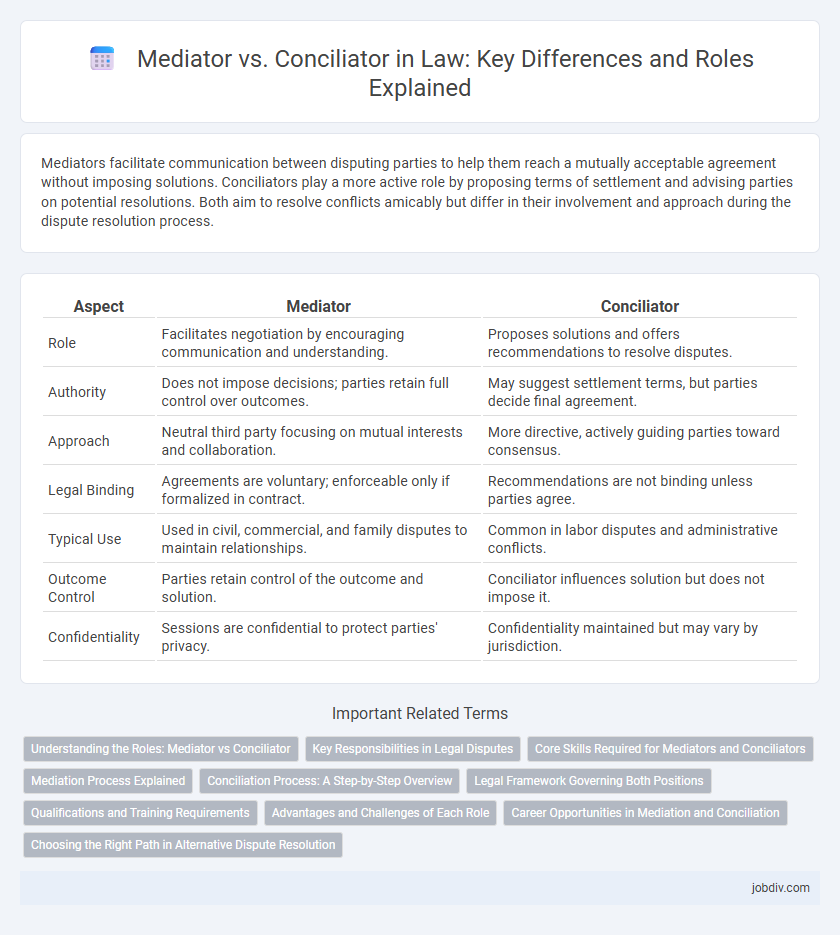Mediators facilitate communication between disputing parties to help them reach a mutually acceptable agreement without imposing solutions. Conciliators play a more active role by proposing terms of settlement and advising parties on potential resolutions. Both aim to resolve conflicts amicably but differ in their involvement and approach during the dispute resolution process.
Table of Comparison
| Aspect | Mediator | Conciliator |
|---|---|---|
| Role | Facilitates negotiation by encouraging communication and understanding. | Proposes solutions and offers recommendations to resolve disputes. |
| Authority | Does not impose decisions; parties retain full control over outcomes. | May suggest settlement terms, but parties decide final agreement. |
| Approach | Neutral third party focusing on mutual interests and collaboration. | More directive, actively guiding parties toward consensus. |
| Legal Binding | Agreements are voluntary; enforceable only if formalized in contract. | Recommendations are not binding unless parties agree. |
| Typical Use | Used in civil, commercial, and family disputes to maintain relationships. | Common in labor disputes and administrative conflicts. |
| Outcome Control | Parties retain control of the outcome and solution. | Conciliator influences solution but does not impose it. |
| Confidentiality | Sessions are confidential to protect parties' privacy. | Confidentiality maintained but may vary by jurisdiction. |
Understanding the Roles: Mediator vs Conciliator
A mediator facilitates negotiation between disputing parties by promoting communication and helping them reach a voluntary agreement, emphasizing neutrality without suggesting solutions. A conciliator, while also neutral, takes a more active role by proposing possible solutions and offering expert advice to resolve conflicts efficiently. Understanding these distinctions clarifies their appropriate application in legal dispute resolution processes.
Key Responsibilities in Legal Disputes
Mediators facilitate communication between disputing parties to help them reach a mutually acceptable agreement without imposing solutions. Conciliators often take a more interventionist approach by actively proposing terms of settlement and guiding parties toward resolution. Both roles emphasize confidentiality and voluntary participation but differ in the degree of control exercised over dispute outcomes.
Core Skills Required for Mediators and Conciliators
Mediators require strong neutrality, active listening, and effective communication skills to facilitate open dialogue between disputing parties, aiming for a mutually acceptable resolution. Conciliators must possess expertise in conflict resolution, negotiation tactics, and legal knowledge to provide informed recommendations and bridge gaps between parties. Both roles demand emotional intelligence, patience, and cultural sensitivity to manage diverse perspectives and maintain trust throughout the dispute resolution process.
Mediation Process Explained
The mediation process involves a neutral third party, the mediator, who facilitates communication between disputing parties to help them reach a mutually acceptable agreement without imposing a decision. Unlike a conciliator, the mediator actively guides the discussion, encourages understanding, and helps clarify issues while maintaining confidentiality and neutrality. This collaborative approach reduces litigation costs and promotes sustainable resolutions by empowering parties to control the outcome of their dispute.
Conciliation Process: A Step-by-Step Overview
The conciliation process involves an impartial conciliator who facilitates communication between disputing parties to reach a mutually acceptable agreement without imposing a decision. Typically, the process begins with an initial meeting where parties outline issues, followed by joint sessions to explore solutions and private meetings to address sensitive points. The conciliator actively proposes possible terms of settlement, aiming to resolve conflicts efficiently while maintaining confidentiality and preserving relationships.
Legal Framework Governing Both Positions
The legal framework governing mediators and conciliators varies by jurisdiction but commonly includes statutory regulations and court rules that define their roles, duties, and scope of authority. Mediators typically facilitate negotiations without imposing solutions, guided by confidentiality provisions and voluntary participation principles established under laws like the Uniform Mediation Act. Conciliators may have more directive powers under specific legal codes, enabling them to propose settlement terms and resolve disputes through more structured intervention mechanisms.
Qualifications and Training Requirements
Mediators typically require specialized certification and training in negotiation, conflict resolution, and mediation techniques, often completed through accredited programs recognized by professional organizations such as the American Bar Association. Conciliators usually need expertise in the specific industry or subject matter of the dispute, along with training focused on facilitating agreements and bridging communication gaps, though formal certification is less standardized than for mediators. Both roles emphasize strong communication skills and impartiality, but mediators often undergo more comprehensive and formalized training aligned with legal standards.
Advantages and Challenges of Each Role
A mediator facilitates dialogue between disputing parties to reach a mutually acceptable agreement, offering advantages such as confidentiality, neutrality, and the promotion of self-determination, but challenges include potential power imbalances and the lack of enforceability of the agreement. A conciliator actively suggests solutions and provides expert recommendations, which can expedite settlement and reduce conflict intensity; however, this role may face challenges related to perceived bias and limited acceptance if parties prefer more control over outcomes. Both roles aim to resolve disputes efficiently while preserving relationships, but their effectiveness depends on the context of the conflict and the willingness of parties to engage cooperatively.
Career Opportunities in Mediation and Conciliation
Career opportunities in mediation and conciliation are expanding rapidly due to increasing demand for alternative dispute resolution in legal, corporate, and community sectors. Mediators often find roles in courts, private practices, government agencies, and nonprofit organizations, specializing in civil, family, and commercial disputes. Conciliators typically work within labor relations boards, regulatory agencies, or international organizations, focusing on preventing conflicts and facilitating agreements before formal litigation.
Choosing the Right Path in Alternative Dispute Resolution
Choosing between a mediator and a conciliator depends on the nature of the dispute and desired level of intervention in Alternative Dispute Resolution (ADR). Mediators facilitate communication and encourage mutual agreement without imposing solutions, ideal for preserving relationships. Conciliators take a more advisory role, offering recommendations to bridge gaps when parties seek expert guidance in resolving conflicts.
Mediator vs Conciliator Infographic

 jobdiv.com
jobdiv.com